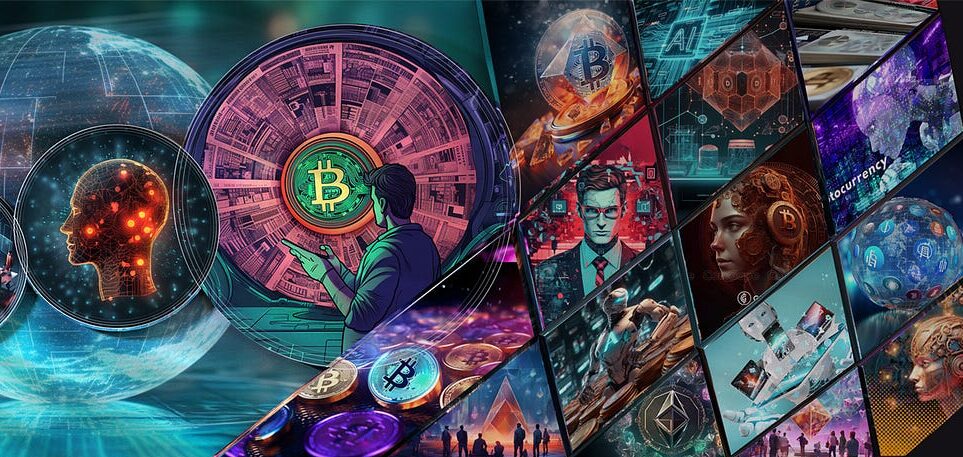Cryptocurrency has become a cornerstone of the financial and technological revolution over the past decade, with the advent of decentralized, blockchain-based digital assets like Bitcoin and Ethereum. But what happens when Artificial Intelligence (AI) takes on a larger role in cryptocurrency creation and management? Can AI design and manage its own cryptocurrency based on market trends, or will human oversight always be necessary?
In this post, we explore the concept of AI-generated cryptocurrencies and examine whether AI has the capability to autonomously create, manage, and optimize cryptocurrencies without human intervention.
What Are AI-Generated Cryptocurrencies?
AI-generated cryptocurrencies refer to digital assets that are either created or managed by AI systems. These cryptocurrencies can leverage advanced machine learning algorithms to dynamically adjust their supply, demand, and governance, based on real-time market conditions. The idea is that AI can assess market trends, economic data, and investor sentiment to create a cryptocurrency that aligns with changing market dynamics.
An example of AI’s application in the crypto space is the creation of algorithmic stablecoins. These are cryptocurrencies designed to maintain price stability through the use of algorithms that adjust the supply of tokens based on market fluctuations. AI could enhance this by predicting changes in market conditions and adjusting the cryptocurrency’s supply more efficiently than traditional models.
Can AI Design Its Own Cryptocurrency?
The idea of an AI autonomously designing a cryptocurrency is intriguing, but it raises several questions. While AI can certainly play a role in designing tokenomics (the economic model behind a cryptocurrency), the actual creation of a cryptocurrency requires a deep understanding of both the underlying technology (blockchain) and the economic principles that govern it.
AI has already demonstrated its ability to create certain types of financial products. For example, AI algorithms are used in DeFi (Decentralized Finance) platforms to optimize liquidity, adjust interest rates, or predict the best investment strategies. In theory, AI could apply similar principles to create a cryptocurrency, adjusting its features based on real-time data and market needs.
However, human oversight will likely remain essential in the early stages of AI-generated cryptocurrencies. While AI can process vast amounts of data and detect patterns, the complexity of the cryptocurrency market and the economic models that underpin them requires human input to ensure fairness, security, and compliance with regulations.
AI’s Role in Cryptocurrency Management
Beyond creation, AI can also play a significant role in managing the dynamics of a cryptocurrency once it’s launched. For example:
- Market Trend Prediction: AI algorithms can analyze historical data and current market conditions to predict short-term and long-term price movements, helping to adjust supply and demand dynamically.
- Risk Management: AI can monitor network activities and detect irregularities or potential security threats, automating responses such as freezing accounts or halting transactions if suspicious behavior is detected.
- Tokenomics Optimization: AI can adjust the economic model behind a cryptocurrency, such as inflation rates, staking rewards, and token burn rates, to maintain stability or achieve specific goals.
Challenges and Ethical Considerations
While AI has enormous potential in cryptocurrency creation and management, there are significant challenges and risks:
- Lack of Accountability: If an AI system autonomously creates and manages a cryptocurrency, it may lack the transparency and accountability that human-run projects typically provide. This could lead to issues with trust and governance, as it may be unclear who is responsible for decisions made by the AI.
- Security Risks: Autonomous AI systems are not immune to vulnerabilities. A hacked AI system could have catastrophic effects, manipulating the cryptocurrency’s value or governance structure.
- Ethical and Legal Concerns: AI-driven cryptocurrencies could raise questions about the ethical implications of decentralizing financial systems without proper regulation or oversight.
Conclusion
The rise of AI-generated cryptocurrencies presents an exciting new frontier in the blockchain and cryptocurrency space. AI has the potential to create and manage digital assets based on real-time data, optimizing them in ways that are difficult for humans to achieve. However, the complexity and risks involved mean that human oversight will likely remain necessary for the foreseeable future.
Disclaimer: Cryptocurrencies, particularly those driven by AI algorithms, are experimental and carry high risks. Always conduct proper due diligence before considering investment options.




